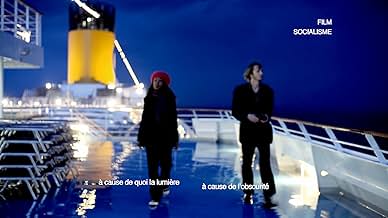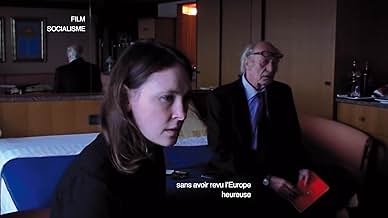The passengers on a Mediterranean cruise enjoy their luxuries as a small family struggles with overbearing media attention.The passengers on a Mediterranean cruise enjoy their luxuries as a small family struggles with overbearing media attention.The passengers on a Mediterranean cruise enjoy their luxuries as a small family struggles with overbearing media attention.
- Awards
- 5 wins & 2 nominations total
Agatha Couture
- Alissa (segment "Des choses comme ça")
- (as A. Couture)
Mathias Domahidy
- Mathias (segment "Des choses comme ça")
- (as M. Domahidy)
Quentin Grosset
- Ludovic (segment "Des choses comme ça")
- (as Q. Grosset)
Maurice Sarfati
- (segment "Des choses comme ça")
- (as M. Sarfati)
Nadège Beausson-Diagne
- Constance (segment "Des choses comme ça")
- (as N. Beausson)
Dominique Devals
- (segment "Des choses comme ça")
- (as D. Devals)
Marine Battaggia
- Florine "Flo" Martin (segment "Quo vadis Europa")
- (as M. Battaggia)
Featured reviews
It was eagerly awaited for years,the trailer which was the whole film in fast motion looked ravishing, and it seemed as if in this,perhaps his last film,Godard would deliver his final testament,a summation of all the themes which have run through his work for the last fifty years.From the beginning it looks absolutely stunning.In its high def cinematography the colours are gorgeous,the Mediterranean setting recalling that of Le Mépris ,but whereas the latter film was a profound meditation on European culture and civilisation,here the characters spout banal platitudes about politics or philosophy as the ship sails along past various cities; in the Spanish section there is a scene of a bullfight,in the Italian section a clip from a Rossellini film,it's that predictable.
In the final section the film switches to one of Godard's favourite subjects,the daily routine of a family with young children who run a petrol station and have for no apparent reason a pet llama.Here finally the film shows some kind of rapport with its characters but it is already too late.Yet despite its faults it still exhibits all the hallmarks of Godard's style,the brilliance of his framing and editing,the crucial way sound plays against image,but the feeling persists that perhaps he has no longer anything to say.
In the final section the film switches to one of Godard's favourite subjects,the daily routine of a family with young children who run a petrol station and have for no apparent reason a pet llama.Here finally the film shows some kind of rapport with its characters but it is already too late.Yet despite its faults it still exhibits all the hallmarks of Godard's style,the brilliance of his framing and editing,the crucial way sound plays against image,but the feeling persists that perhaps he has no longer anything to say.
Steve Pulaskie's negative review of "Film Socialisme" inadvertently, by its very length and detail, betrays the fascination a good Godard can exert even on the "unimpressed." I'll let the positive reviews -- not all of which I have read -- speak to my own liking for this film. I need to see it more times, especially after my French is more fluent than it is. But my take is that "Film Socialisme" is meant to provoke thought and questions, not answer them ... notwithstanding one can pick up a good notion of where Godard is coming from. But -- to echo any other reviews that have said the same -- "Film Socialisme" should NEVER be anyone's introduction to Godard! Whether or not it's really his last film, it comes 50+ years after his first films blew up the way everyone made movies ... and, yes, they even have plots. I have seen only a few of them, but am buying up more. The main IMDb web-page features a number of fans listing their top Godards; I refer newbies to them. By all means see "A bout de soufflé," "Une femme est une femme," "Alphaville," "Pierrot le Fou," "Band of Outsiders," and maybe "Weekend" -- and only then try "Film Socialisme." But this last film shows me Godard hasn't lost a thing he started with. He still has all his outrageous playful inventiveness, exuberant effrontery: he still makes a movie MOVE; this film is more CINEMA than the most CINEMA flick he ever tossed off. See the early ones -- on which his rep will always rest -- then re-see this one. Whether you like "Film Socialisme" or not, you'll know what I mean.
Film socialisme (2010)
BOMB (out of 4)
How does one go about explaining Jean-Luc Godard's FILM SOCIALISME? I guess you could say that the director just throws at us various film clips. Some take place on a ship. Some take place in Egypt. Some just seem to be random shots of people walking around. Some are film in beautiful HD while others are filmed on what appears to be a very old cell phone. The subtitles are often full of mistakes. It could be that the words are put together to where it's hard to read them. It could be that the subtitles aren't really telling us what the characters are saying. Was there a point to this madness? I think there are two possibilities. One is that Godard wanted to drive people to suicide so he made this film. The other theory of mine is that he wanted to make a film so horrid that his followers would still rave about how great it was. Either way this here is a pretty worthless film and it's not that it's horrible because of a horrible filmmaker. No, it's horrible because the filmmaker knows he's making something that is nothing but a waste of time. The reason Godard does this is beyond me but sitting through this film is quite unpleasant and it makes one realize that this film is so bad that you couldn't even recommend it to those who love bad movies. I'm not going to lie and say Godard is one of my favorite filmmakers because he isn't. There have been highly respected films of his (like ALPHAVILLE) that I simply hated. With that said, I could see why some would be drawn to it. With this movie it's just pure garbage and I must admit that I find it funny reading so many reviews that call this a piece of art and one of the greatest films of the decade. Reading Roger Ebert's review states that Godard showed this film in a four-minute version by playing it with the fast-forward button on high. This here might have been the greatest idea the director ever had.
BOMB (out of 4)
How does one go about explaining Jean-Luc Godard's FILM SOCIALISME? I guess you could say that the director just throws at us various film clips. Some take place on a ship. Some take place in Egypt. Some just seem to be random shots of people walking around. Some are film in beautiful HD while others are filmed on what appears to be a very old cell phone. The subtitles are often full of mistakes. It could be that the words are put together to where it's hard to read them. It could be that the subtitles aren't really telling us what the characters are saying. Was there a point to this madness? I think there are two possibilities. One is that Godard wanted to drive people to suicide so he made this film. The other theory of mine is that he wanted to make a film so horrid that his followers would still rave about how great it was. Either way this here is a pretty worthless film and it's not that it's horrible because of a horrible filmmaker. No, it's horrible because the filmmaker knows he's making something that is nothing but a waste of time. The reason Godard does this is beyond me but sitting through this film is quite unpleasant and it makes one realize that this film is so bad that you couldn't even recommend it to those who love bad movies. I'm not going to lie and say Godard is one of my favorite filmmakers because he isn't. There have been highly respected films of his (like ALPHAVILLE) that I simply hated. With that said, I could see why some would be drawn to it. With this movie it's just pure garbage and I must admit that I find it funny reading so many reviews that call this a piece of art and one of the greatest films of the decade. Reading Roger Ebert's review states that Godard showed this film in a four-minute version by playing it with the fast-forward button on high. This here might have been the greatest idea the director ever had.
Jean-Luc Godard is a reference in cinema and changed the art fifty years ago with a unique challenging style that defied current esthetics and etiquette.
His latest work can be described more as an eclectic experiment than any enduring piece of cinema, but it serves to show his mastery of the art and his ability to dissect it in its most basic components before trying to create a different, distinct experience for the viewer. He plays with themes, locations, styles and intermingles with little restriction photos, videos, ambient sounds, silence, music, narrations, monologues, dialogues to delves into a dream-like undefined cinematic discussion.
The film does not quite work as a whole, precisely from this lack of focus, but some of the imagery (some sharp and some out of focus, some old and some new, some seemingly meaningless and some full of allegories, etc.), dialogues (existential, simple, social, revolutionary) and intertitles do reach a cord and will be remembered subconsciously or consciously. It's lack of clear content or continuity should not take away from it's task of deconstruction and desire to destabilise our current comforts. In that aspect, Godard grabs the rug under conventional cinema and pulls very hard to make it topple over dumbfounded and confused.
There are three segments, each shorter than the previous, but besides being glad to finally leave this seemingly derelict boat and to briefly know a fictional philosophising family, there is not enough distinction between the segments to warrant further feedback at this point. Only that as Godard's life perhaps, and exemplified in the crafty ancient time-telling device in segment #2, time is getting shorter...
Maybe we'll get it right some day, may be one of many messages of this remue-méninges.
His latest work can be described more as an eclectic experiment than any enduring piece of cinema, but it serves to show his mastery of the art and his ability to dissect it in its most basic components before trying to create a different, distinct experience for the viewer. He plays with themes, locations, styles and intermingles with little restriction photos, videos, ambient sounds, silence, music, narrations, monologues, dialogues to delves into a dream-like undefined cinematic discussion.
The film does not quite work as a whole, precisely from this lack of focus, but some of the imagery (some sharp and some out of focus, some old and some new, some seemingly meaningless and some full of allegories, etc.), dialogues (existential, simple, social, revolutionary) and intertitles do reach a cord and will be remembered subconsciously or consciously. It's lack of clear content or continuity should not take away from it's task of deconstruction and desire to destabilise our current comforts. In that aspect, Godard grabs the rug under conventional cinema and pulls very hard to make it topple over dumbfounded and confused.
There are three segments, each shorter than the previous, but besides being glad to finally leave this seemingly derelict boat and to briefly know a fictional philosophising family, there is not enough distinction between the segments to warrant further feedback at this point. Only that as Godard's life perhaps, and exemplified in the crafty ancient time-telling device in segment #2, time is getting shorter...
Maybe we'll get it right some day, may be one of many messages of this remue-méninges.
Far to be a Godard admirer, I was real seduced by this film, a mix of cultural references about Mediteranean area, a good pledge for language as obstacle of understanding, eccentric, innovative, absurd in essence, proposing characters and theirs memories and believes , but not exactly a story.
A film about time and masks and past and facts as pieces of puzzle , it is a provocative invitation to viewer to create his explanations or - and doubts.
For me, the old watch is the main scene defining this film who remains a clash by fragments of doczmentary, stains of kitsch and rediscover of past. All, in essence, in the most honest manner.
A film about time and masks and past and facts as pieces of puzzle , it is a provocative invitation to viewer to create his explanations or - and doubts.
For me, the old watch is the main scene defining this film who remains a clash by fragments of doczmentary, stains of kitsch and rediscover of past. All, in essence, in the most honest manner.
Did you know
- TriviaThe film did not include traditional English language subtitles for releases in countries that spoke such language. Instead, the subtitles were in "Navajo English", a translation that baffled many critics and audience members.
- GoofsSomeone claims that Napoleon founded the Comédie-Française in 1812 in Moscow. Actually, it was founded in 1680 by Louis XIV.
- Quotes
Rebecca (segment "Des choses comme ça"): [dialogue continuity] You're absolutely right: I don't love any "people." Not French, not North American, not German. Not Jewish people, not black people. I love only my friends... When there are any.
- ConnectionsEdited from Battleship Potemkin (1925)
- SoundtracksMamita mia
Performed by Ernst Busch
- How long is Film socialisme?Powered by Alexa
Details
- Release date
- Countries of origin
- Official site
- Languages
- Also known as
- Film Socialism
- Filming locations
- Production companies
- See more company credits at IMDbPro
Box office
- Gross US & Canada
- $42,925
- Opening weekend US & Canada
- $4,526
- Jun 5, 2011
- Gross worldwide
- $222,079
Contribute to this page
Suggest an edit or add missing content

























